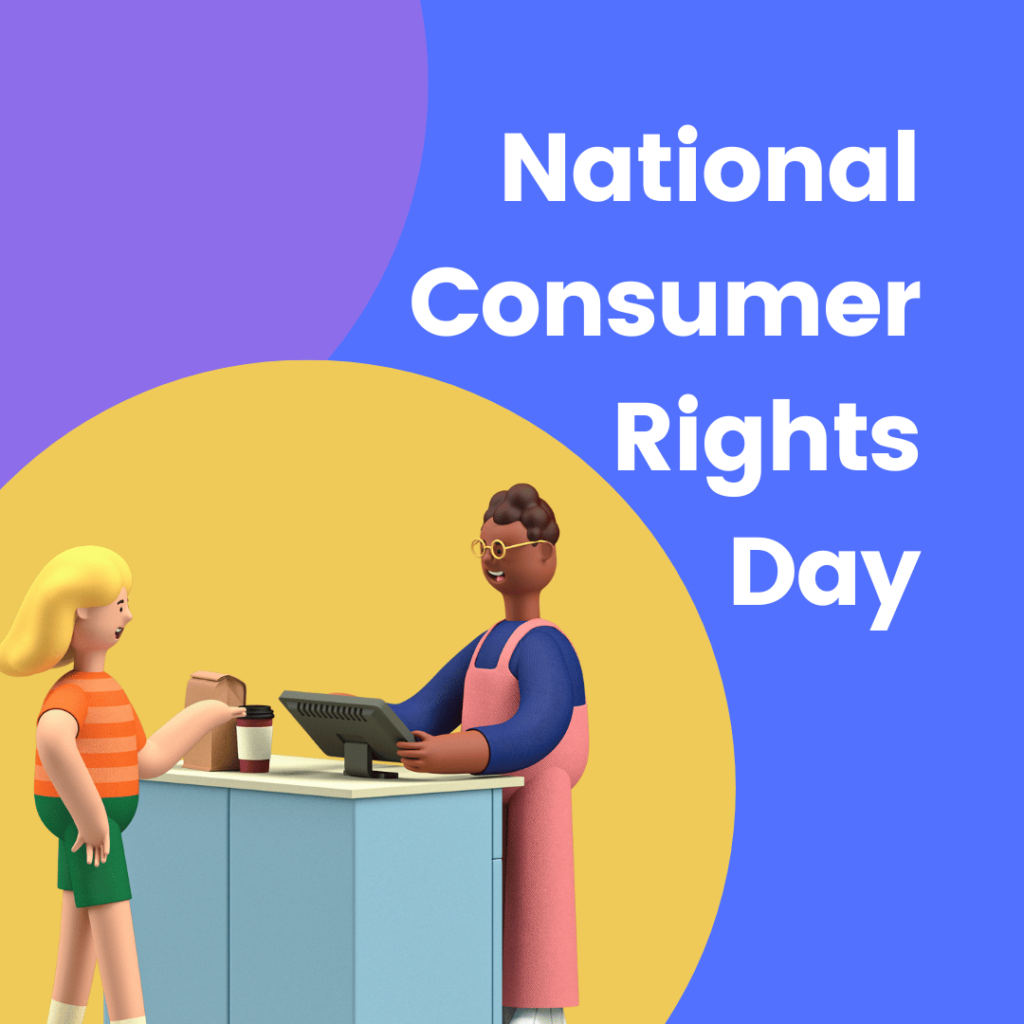When is National Consumer Day celebrated in India?
National Consumer Day 2024 is celebrated on Tuesday, December 24 in India.
Also Read: National Farmers Day 2024: Theme, Date, History, Importance, Activities, Quotes and Wishes
Also Read: National Mathematics Day 2024: Theme, Date, History, Importance, Activities, Facts and Quotes
Also Read: Winter solstice 2024: Date, History, Importance, Celebration and Myths
Also Read: International Human Solidarity Day 2024: Theme, Date, History, Importance, Activities and Quotes
Why is National Consumer Day celebrated?
National Consumer Day celebrates the enactment of the Consumer Protection Act, 1986, a landmark law aimed at safeguarding consumer rights. This day is dedicated to raising awareness about consumer rights and responsibilities while emphasizing the importance of protecting consumers from unfair trade practices, fraud, and exploitation.
The main reason for observing this day is to remind everyone—consumers, businesses, and policymakers—of the significance of empowering individuals with knowledge about their rights. It also encourages consumers to stand up against unethical practices and make informed decisions when purchasing goods or services.
What is the theme for National Consumer Day 2024?
The theme for National Consumer Day 2024 is “Virtual Hearings & Digital Access to Consumer Justice.” It emphasizes making consumer rights and justice more accessible through technology. By using virtual hearings and digital tools, the goal is to simplify the process for consumers to raise complaints and resolve disputes, ensuring quicker and more convenient access to justice.
What is the history behind National Consumer Day?
The history of National Consumer Day in India is tied to the enactment of the Consumer Protection Act, 1986, a landmark legislation designed to safeguard consumer rights and ensure protection from exploitation. This act was passed by both Houses of Parliament and received presidential assent on December 24, 1986, a date that became significant for commemorating consumer rights in India.
It also outlined six fundamental rights for consumers, including protection from hazardous goods, access to accurate information, and the right to redressal and consumer education.
In 2019, this legislation was updated and replaced by the Consumer Protection Act, 2019, to include modern consumer challenges, such as e-commerce disputes and misleading advertisements, while establishing the Central Consumer Protection Authority (CCPA) to strengthen enforcement. The day emphasizes the importance of empowering consumers in a dynamic market and ensuring accountability from businesses.
What are the rights of consumers under the Consumer Protection Act?

The Consumer Protection Act in India outlines six key rights for consumers, ensuring their safety and empowering them against unfair practices. Following is a breakdown of these rights:
- Right to Safety: Consumers have the right to be protected from goods and services that are hazardous to their life and property. This includes ensuring that products meet safety standards and are free from risks.
- Right to Information: This right ensures that consumers are informed about the quality, quantity, potency, purity, standard, and price of goods and services, allowing them to make informed choices.
- Right to Choose: Consumers can access a variety of goods and services at competitive prices without being coerced into purchasing a specific product, ensuring fair competition.
- Right to Redressal: If consumers face issues like defective goods, unsatisfactory services, or unfair trade practices, they have the right to seek compensation or remedy through established forums such as Consumer Disputes Redressal Commissions.
- Right to Consumer Education: This right emphasizes educating consumers about their rights and responsibilities, equipping them to make informed decisions and protect themselves.
- Right to be Heard: Consumers have the right to voice their grievances and concerns in appropriate forums, ensuring their issues are addressed effectively.
How is National Consumer Day different from World Consumer Rights Day?
National Consumer Day, observed on December 24 in India, and World Consumer Rights Day, held on March 15 globally, serve distinct purposes despite both advocating for consumer rights.
National Consumer Day commemorates the enactment of the Consumer Protection Act of 1986 in India, emphasizing the empowerment and protection of Indian consumers. It highlights rights like protection against unfair trade practices, the right to be informed, and access to grievance redressal. Activities on this day focus on awareness campaigns, legal literacy sessions, and community initiatives aimed specifically at the Indian consumer.
In contrast, World Consumer Rights Day addresses broader, global consumer issues and challenges. Established in 1983, it unites consumer organizations worldwide to campaign on themes like sustainable consumption, digital fairness, or energy transitions. This day leverages international platforms to influence global policy and promote equitable marketplaces.
In summary, National Consumer Day is India-centric, focusing on local legislation and issues, while World Consumer Rights Day addresses global consumer rights and emerging challenges on an international scale.
What is the significance of the Consumer Protection Act of 1986?

The Consumer Protection Act of 1986 is a landmark legislation in India that safeguards the rights of consumers and provides a legal framework for addressing their grievances. Following is why it holds significant importance:
- Empowering Consumers: The Act defines key rights for consumers, such as the right to safety, information, choice, and redressal, ensuring they are protected against unfair trade practices and defective goods or services.
- Dispute Resolution: It introduced a three-tier consumer dispute redressal system comprising District Forums, State Commissions, and the National Commission.
- Curbing Exploitation: The Act addresses unfair trade practices, misleading advertisements, and exploitation, promoting fairness in the marketplace.
- Encouraging Responsible Business Practices: Businesses are held accountable for maintaining product quality, ensuring safety, and providing accurate information to consumers.
- Consumer Education: The Act highlights the importance of consumer awareness and education, empowering individuals to make informed choices and demand quality.
What activities are organized to celebrate National Consumer Day?
National Consumer Day is celebrated with various activities aimed at spreading awareness about consumer rights and empowering individuals to make informed decisions. Following is how the day is observed:
- Educational Programs: Seminars, workshops, and conferences are organized to educate people about their rights under the Consumer Protection Act.
- Awareness Campaigns: The government and consumer organizations conduct campaigns through social media, newspapers, and television. Initiatives like “Jago Grahak Jago” encourage consumers to recognize unethical practices and their remedies.
- Interactive Activities: Competitions, quizzes, and debates are held in schools, colleges, and public forums to engage younger audiences in consumer awareness discussions.
- Support Services: Efforts are made to promote consumer helplines like the National Consumer Helpline and the e-Daakhil portal. These services offer a platform for consumers to file complaints and seek resolutions.
- Recognition Programs: Awards and acknowledgments are given to individuals and organizations contributing significantly to consumer rights advocacy.
How can consumers file a complaint on National Consumer Day?

Filing a complaint on National Consumer Day or any other day throughout the year involves a few straightforward steps:
- Understand Your Rights: Familiarize yourself with the Consumer Protection Act, which provides a framework for seeking redress for issues like defective products, misleading advertisements, and poor services. Knowing your rights empowers you to file a complaint effectively.
- Gather Documentation: Collect all relevant documents that support your complaint. This may include purchase receipts, warranties, communication with the seller or service provider, and any other evidence related to the issue at hand.
- Choose the Right Forum: For issues related to products or services up to a certain monetary limit, you can approach the Consumer Disputes Redressal Forum (CDRF) or State Consumer Disputes Redressal Commission (SCDRC).
- Online Filing: Nowadays, many consumer forums offer online complaint filing facilities. You can visit their official websites, fill out a complaint form, and submit it electronically.
- In-Person Filing: Complaints can also be filed physically by visiting the respective consumer forum’s office. Ensure to carry all your documents and a written complaint detailing the issue clearly and concisely.
- Follow Up: After filing the complaint, keep a record of the complaint number or any reference ID provided. Regularly check on the status of your complaint through the official website.
What is the purpose of the “Jago Grahak Jago” campaign?
The “Jago Grahak Jago” campaign is a government initiative in India aimed at educating consumers about their rights and encouraging them to be more aware and vigilant when making purchasing decisions. Launched by the Department of Consumer Affairs, this campaign focuses on empowering consumers to make informed choices and protect themselves from unfair trade practices.
How does the Consumer Protection Act help safeguard consumer interests?
The Consumer Protection Act, a crucial piece of legislation in India, is designed to protect and promote the interests of consumers against unfair trade practices and exploitation.
- Legal Framework: The Consumer Protection Act provides a legal framework that outlines the rights of consumers and the responsibilities of businesses.
- Redressal Mechanisms: One of the key features of the Consumer Protection Act is the establishment of quasi-judicial bodies such as Consumer Disputes Redressal Commissions (CDRCs) at the district, state, and national levels. These forums are accessible to consumers and provide an avenue to resolve disputes quickly and efficiently.
- Protection from Unfair Trade Practices: The act prohibits unfair trade practices, such as false advertising, deceptive labeling, and misrepresentation of the quality or benefits of a product.
- Compensation for Deficiencies: The Consumer Protection Act also ensures that consumers can seek compensation for deficiencies in goods or services.
- Promoting Fair Market Practices: By enforcing the Consumer Protection Act, the government promotes fair market practices.
What is the role of the Department of Consumer Affairs on National Consumer Day?

The Department of Consumer Affairs in India plays a crucial role in promoting consumer rights and ensuring consumer welfare.
- Raising Awareness: The Department of Consumer Affairs uses National Consumer Day as a platform to educate the public about their rights and responsibilities as consumers.
- Organizing Events: The department organizes events, contests, and activities on this day to engage the public and involve them in consumer rights advocacy.
- Policy Advocacy: The Department of Consumer Affairs plays a pivotal role in advocating for policies that protect consumers.
- Facilitating Redressal: One of the core responsibilities of the department is to oversee the functioning of Consumer Disputes Redressal Commissions (CDRCs) across the country.
- Collaboration and Partnerships: The department collaborates with various stakeholders, including consumer organizations, NGOs, industry bodies, and educational institutions, to promote consumer education and protection.
How can consumers educate themselves about their rights on National Consumer Day?
Educating oneself about consumer rights is crucial for making informed decisions and protecting oneself from unfair practices. Here’s how consumers can educate themselves on this day and beyond:
- Understand the Consumer Protection Act: Consumers can familiarize themselves with the provisions of this act by reading official documents, brochures, and online resources provided by the Department of Consumer Affairs.
- Participate in Awareness Programs: Various organizations and government agencies conduct workshops, seminars, and webinars on National Consumer Day to educate the public about their rights.
- Utilize Government Websites and Portals: The Department of Consumer Affairs and other government bodies have informative websites that provide detailed information about consumer rights and remedies.
- Follow Consumer Awareness Campaigns: Many non-governmental organizations (NGOs) and consumer rights groups run public awareness campaigns throughout the year.
- Learn from Real-life Scenarios: Engaging with real-life case studies and success stories of consumers who have successfully resolved their grievances can be very educational.
- Ask Questions and Seek Help: Consumers can reach out to helpline numbers and advisory services provided by the government or consumer organizations. These helplines offer free advice and assistance regarding consumer complaints and rights.


